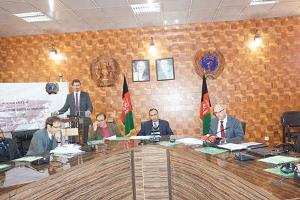 26 January 2017 – A team consisting of Afghan and international experts conducted a Joint External Evaluation of Afghanistan’s capacity under the International Health Regulations (IHR 2005) to prevent, detect and rapidly respond to various public health risks. The evaluation was carried out on 4–7 December 2016 in Kabul by a multidisciplinary team of 11 experts.
26 January 2017 – A team consisting of Afghan and international experts conducted a Joint External Evaluation of Afghanistan’s capacity under the International Health Regulations (IHR 2005) to prevent, detect and rapidly respond to various public health risks. The evaluation was carried out on 4–7 December 2016 in Kabul by a multidisciplinary team of 11 experts.
 26 January 2017 – A team consisting of Afghan and international experts conducted a Joint External Evaluation of Afghanistan’s capacity under the International Health Regulations (IHR 2005) to prevent, detect and rapidly respond to various public health risks. The evaluation was carried out on 4–7 December 2016 in Kabul by a multidisciplinary team of 11 experts.
26 January 2017 – A team consisting of Afghan and international experts conducted a Joint External Evaluation of Afghanistan’s capacity under the International Health Regulations (IHR 2005) to prevent, detect and rapidly respond to various public health risks. The evaluation was carried out on 4–7 December 2016 in Kabul by a multidisciplinary team of 11 experts.
The International Health Regulations are an international legal instrument that aims to help the international community prevent and respond to acute public health risks that have the potential to cross borders and threaten people worldwide. Under IHR, which entered into force in 2007, countries were required to develop certain minimum core public health capacities by 2012 to detect public health emergencies of international concern (PHEIC). However, many countries, including Afghanistan, have been unable to fully develop these required capacities.
Facilitated by the Ministry of Public Health and WHO, the Joint External Evaluation was led by Dr Mika Salminen, director of the Department of Infectious Diseases at the Finnish National Institute for Health and Welfare, and DrDalia Samhouri, IHR regional contact point at the WHO Regional Office for the Eastern Mediterranean.
“This external evaluation is critical for Afghanistan as it enables us to fully assess the country’s capacity to prevent, detect and rapidly respond to public health threats independently and see where the gaps are,” said Dr Richard Peeperkorn, WHO Representative in Afghanistan. “Led by independent experts, this evaluation is crucial as we need full transparency and accountability to implement IHR successfully and to uphold global public health security.”
Various technical areas, such as national legislation and policy, zoonotic diseases, antimicrobial resistance, biosafety and immunization, along with the national laboratory system and real-time surveillance, were assessed. Afghanistan ranked high on its capacity in real-time surveillance and zoonotic diseases when compared to the 10 countries in the WHO Eastern Mediterranean Region where a similar evaluation has been conducted.
The evaluation team recommended that a national committee of legal advisors and public health officers is set up to review national legislation and policies to identify gaps and corrective measures to accelerate IHR implementation. Moreover, the team recommended that a national action plan for IHR implementation should be developed based on the evaluation findings.
Establishing a food control authority, developing a national biosafety and biosecurity strategy, as well as strengthening the capacity of regional and provincial laboratories, were among the other key priority areas highlighted by the evaluation team.
An IHR implementation plan for Afghanistan will be developed in the following months, requiring substantial resource mobilization by development partners and the government with ongoing technical assistance from WHO to ensure full implementation.
A detailed report of the key findings and recommendations of the Joint External Evaluation will be released in January 2017.









